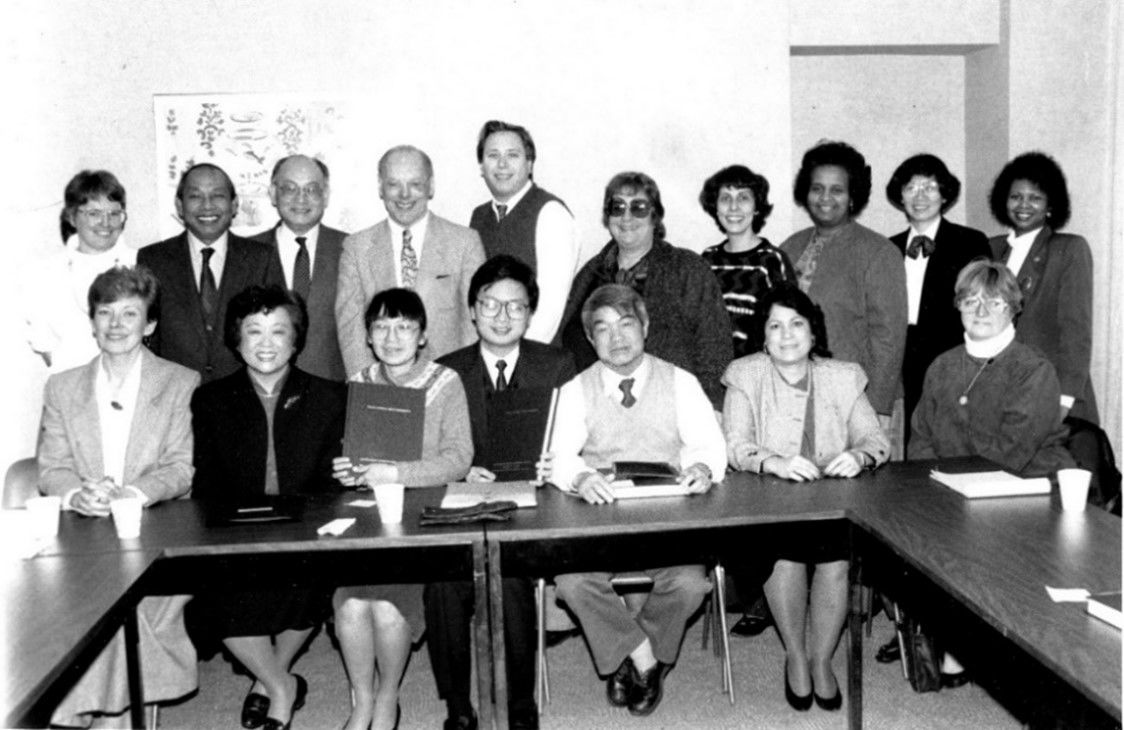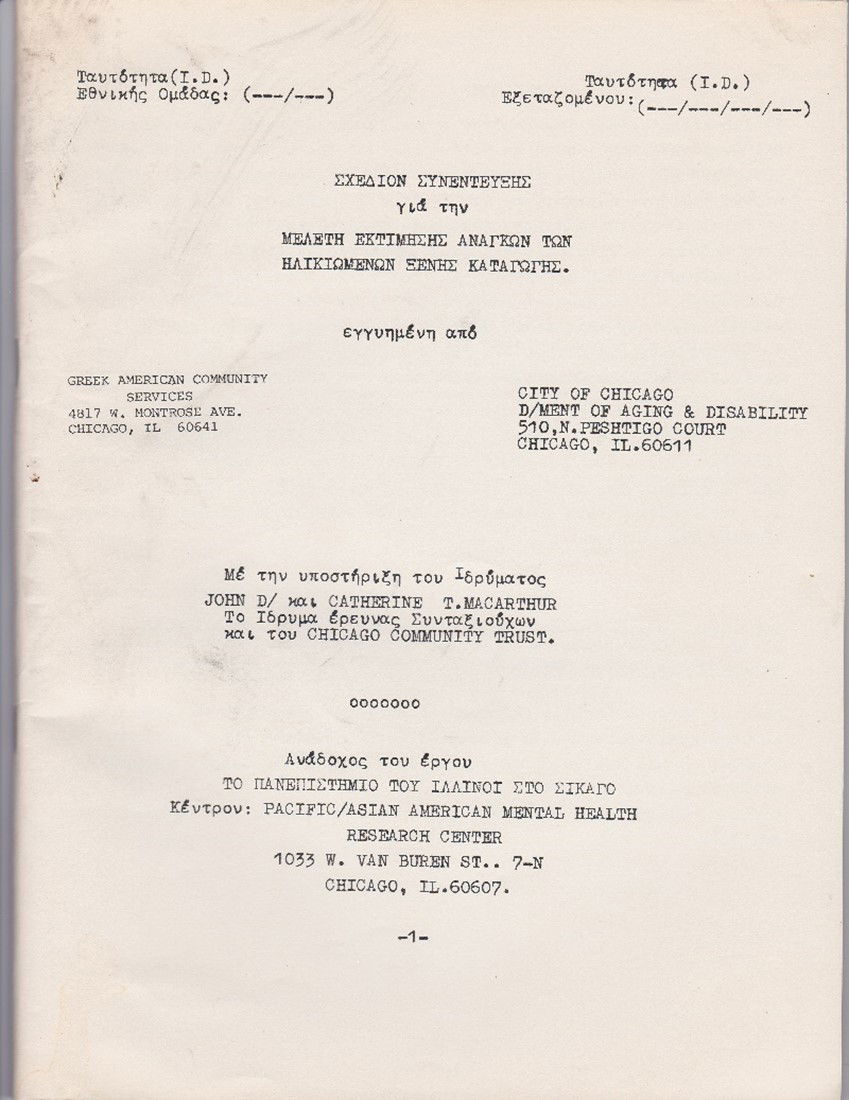Assessing the Needs of Our Elders
From Working to Preserve Our Heritage: The Incredible Legacy of Greek-American Community Services:
"In 1986, the Chicago Department on Aging and Disabilities (DAD) responded to the concerns of organizations advocating for funding in support of programs for the ethnic elderly. We were asking that a portion of the Department’s grant funds be allocated to support and assist ethnic-based organizations serving the elderly who faced language and cultural barriers to accessing essential services.
At the time, mainstream social service agencies lacked staff that could speak the many languages of those seeking assistance. They lacked the cultural understanding and pedigree that was necessary to gain the trust of non-English speaking elderly. These language and cultural barriers often prevented or deterred seniors from receiving the help that they needed.
Up to that point, DAD administered a small program that provided grants to several ethnic providers through its Ethnic Access Grant, including the Assyrian Project for the Elderly. Beyond that, there were virtually no grants focused on ethnic organizations or communities at the local, state, or national levels. Although the Ethnic Access Grant program helped a few communities (including the Assyrian Project for the Elderly), funding was short-term and was a drop in the bucket compared to the myriad of needs of Chicago’s many unique ethnic communities.
These concerns found a receptive ear with the newly appointed commissioner of DAD, Robert J. Ahrens. After having helped to establish and run the Commission for Senior Citizens under Mayor Richard J. Daley in 1956, Ahrens returned to oversee the newly created Mayor’s Office for Senior Citizens and Handicapped. The office was granted cabinet-level status and renamed the Chicago Department on Aging and Disabilities by Chicago Mayor Harold Washington.
In 1987, DAD launched the city’s first comprehensive assessment on the needs of ethnic elderly and tasked Rosemary Gemperle, who worked in their research and planning division, to lead the effort. The Retirement Research Foundation and the Chicago Community Trust provided funding for the project. Twelve ethnic organizations that spoke 10 different languages were selected to take part in the study.
They were: American Spanish Institute (ASI) (Rebecca Cruz and Awilda Gonzalez); Asian Human Services (Peter Laylo); Cambodian Association of Illinois (Kompha Seth); Chinese American Service League (Bernarda Wong); Greek-American Community Services (John Psiharis and Elaine Thomopoulos); Japanese American Service Committee (Rev. Masaru Nambu); Korean American Community Services (Sue Kang); Lithuanian Human Services Council of the U.S.A (Danguale Valentinas); National Association of Hispanic Elderly (Judith Matthews); Polish Welfare Association (now known as Polish American Association), (Carol Bilina and Bruce Dean); Southeast Asia Center (Peter Porr and San O); and Ukrainian Social Services Bureau.
The University of Illinois Center for Asian and Pacific Studies received funding from the city to prepare the survey instrument. Each organization was to contact 150 older adults and interview caregivers and community stakeholders. Organizations received $8.50 for each completed application plus money for the translation of the survey instrument and related expenses.
The survey instrument was translated into Greek and then back translated into English by two different people. Fotios Litsas and Nick Ellis did the translations. Elaine remembers that we encountered a problem when some did not understand the translation because of its academic wording. Rewording was needed to ensure the instrument was understood by the seniors being interviewed. Elaine recalls, 'Those being interviewed did not understand some of the language being used, words that would have been understood by someone who had graduated high school.'
In total, more than 1,500 interviews with senior citizens that hailed from 12 countries and spoke 10 languages were conducted. Ethel Kotsovos coordinated GACS’s participation, trained volunteer interviewers, identified seniors, and scheduled interviews.
The director of each organization, a representative of the University of Illinois, and Rosemary were part of the project’s steering committee. We met regularly to craft the survey instrument and protocols, determine the questions to be asked, and review the progress of the study. This was a unique collaboration, one that had not been seen before; ethnic leaders, the city, and private foundations came together to assess and document the needs of the limited and non-English speaking elderly.
The results of the study shed light on needs within individual ethnic communities as well as in the city as a whole. For the most part, the results documented what the participating organizations already knew; ethnic elderly had difficulty accessing services and benefits due to language and cultural barriers. Many ethnic elderly were isolated from mainstream society and difficult to reach. Ethnic organizations most able to help these seniors were struggling to get by due to funding constraints and the lack of grant opportunities from government agencies and mainstream funders. Homemaker services, home-delivered meals, and adult day care programs were three services that were underutilized by ethnic elderly.
Additionally, it was found that the majority of case managers who assessed the needs of their clients and linked them to these services often did not speak the language of these seniors. Sometimes ethnic organizations provided translators, however, there was no reimbursement for staff time in such cases. Not all organizations had the wherewithal to cover these costs, especially since the case management units were receiving payments for their role and ethnic agencies were not. The study highlighted the sense of isolation that many older adults experienced as well as their tendency to remain insular within their communities.
The results of the study shed light on needs within individual ethnic communities as well as in the city as a whole. For the most part, the results documented what the participating organizations already knew; ethnic elderly had difficulty accessing services and benefits due to language and cultural barriers. Many ethnic elderly were isolated from mainstream society and difficult to reach. Ethnic organizations most able to help these seniors were struggling to get by due to funding constraints and the lack of grant opportunities from government agencies and mainstream funders. Homemaker services, home-delivered meals, and adult day care programs were three services that were underutilized by ethnic elderly. Additionally, it was found that the majority of case managers who assessed the needs of their clients and linked them to these services often did not speak the language of these seniors. Sometimes ethnic organizations provided translators, however, there was no reimbursement for staff time in such cases. Not all organizations had the wherewithal to cover these costs, especially since the case management units were receiving payments for their role and ethnic agencies were not. The study highlighted the sense of isolation that many older adults experienced as well as their tendency to remain insular within their communities."

Pictured (L-R): Seated: Carole Bilina (Polish Welfare Association), Sue Kang (Korean American Community Services), San O (Southeast Asia Center), unknown, Qua Tron (Vietnamese American Association of Illinois), Awilda Gonzalez (ASI), Danguale Valentinas (Lithuanian Human Services Council of the U.S.A). Second row: Rosemary Gemperle (Chicago Department on Aging), Peter Laylo (Asian Human Services), Rev.Masaru Nambu (Japanese American Service Committee), Robert Ahrens (commissioner, Chicago Department on Aging), John Psiharis (Greek-American Community Services), Judith Matthews (National Association for Hispanic Elderly), Elaine Thomopoulos (Greek-American Community Services). Rebecca Cruz (ASI), Elena Yiu (Asian and Pacific Islands Research Center), and Rene Lumpkin (deputy commissioner, Chicago Department on Aging) during the unveiling of the Ethnic Elderly Needs Assessment Study at the Chicago Department on Aging office, 510 N. Peshtigo Court. Date unknown. John Psiharis collection.

The cover of the Greek language version of the Ethnic Elderly Needs Assessment, circa 1987. Elaine Thomopoulos collection.